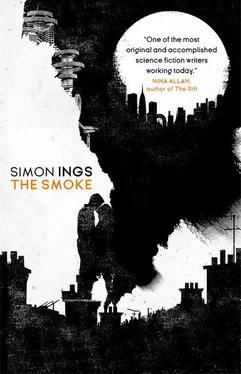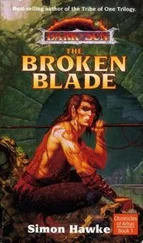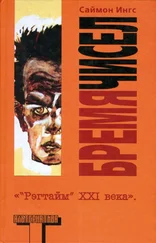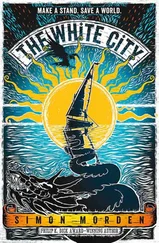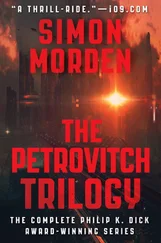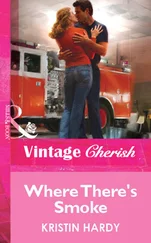The solution was light. Lots of light. Moonlight in particular: that cool, blue suffusion. So the Bund built artificial moons: huge fizzing lights mounted on scaffolds that reached so high they topped its tallest buildings. The Bund’s whole bizarre mass lay like an accident beneath these six unblinking eyes. Residents basked in this rational light, navigating with ease, at last, the night-time maze of their city, and celebrating, through a contented silence, their conquest of the night.
The rest of us hated these six ghastly eyes gushing electric ice, freezing the Bund in a silence that – compared to the bustle in our unaccommodated half of the city – could only suggest the silence that hangs between the detonation of a bomb and the screams of its first victim.
The Bund erected ingenious baffles so that light from the Bund would not spoil the night-time of our half of the city. Still, come nightfall, the Bund’s high towers shone in their reflected light: a bug-zapping effulgence that, according to those old enough to remember the War, brought to mind the terrible first seconds of an atomic explosion. It felt to us as if the Bund was bathing nightly in some terrible, malign radiation. Though, after all, they were only glorified street lights, and only there to help people find their way in the dark.
The uncanny and pitiless glare shed by the Bund’s urban ‘moons’ was a source of exasperated humour for a while – the stuff of acid editorials and pithy stand-up routines. The truth is, though, it unnerved us – and by ‘us’ I mean the unaccommodated majority to the west. Compared to the unbending horror of those rays, the West End’s own piecemeal illuminations – the mass effect of a thousand thousand street lamps and headlights and shop signs and God knows what – felt positively homespun.
And so it came to us that, unlike those strange, friendly folk to the east, we loved the night, and darkness was our friend. Night-time made up part of who we were. Without the night, why would it ever occur to us to gather together? Were there no night, why would lovers ever turn to each other in the dark? We didn’t want to conquer night. We wanted to make light of our own – ordinary, human-scale light – and gather around it, creating little bubbles of humanity in the dark. What were our street lamps and headlights but lanterns? What were our lamps but candles? The night was for stories, for song, for sleep. Summer was hardly over and the gift shops were filled with candles, oil burners, old-fashioned spirit lamps and huge, dim lightbulbs with ornate filaments, not lights so much as ideas of lights; gestures towards illumination. We did not want the day to last for ever, and we wondered at those who did: the ever-industrious Bund, who appeared not to need the night any more. The sleepless Bund who, we reckoned, must have lost the use of some quintessentially human part of themselves.
And thinking this, we began to rage, as surely as a chimpanzee in a zoo, confronting some simple, animatronic version of themselves, will panic and scream and tear the toy to pieces.
Who were the Bund, who did not need the night? Who were they, to buy up half our home and wipe its memory off the face of the Earth?
Capping the matter nicely came the Bund’s long-promised workings on the Moon itself. Once these became visible, I think we all very slightly lost our minds. Who were the Bund, that they were remodelling our Moon? The red-tops, casting around for some means to express their existential outrage, grew literal. And the pictures splashed across their front pages were real enough. Whatever your politics, it was undeniable: the Man who once resided in our Moon had been entirely erased.
* * *
On the Day of Atonement – which was also the day I learned I had earned an upper second from the Bartlett – someone splashed graffiti over Stella’s garden wall. The next day, Fel and I stood across the street, watching two men in blue council overalls scrub away at the mess: a boy with a shaved head and a much older man who paused every few minutes to wind a fringe of thinning hair around his scalp, only so the breeze could unwind it again.
‘We’d better go in.’
Fel took my hand and led me across the street.
‘I didn’t expect anything that bad.’ I was quite shaken.
Fel said nothing, and I wondered if I was being naive.
Stella and Georgy were in the dining room with little Betty. Sprawled across a rug in the corner, she was painstakingly constructing a tower of brightly coloured wooden blocks. She had outgrown the game already, and she moved the blocks about dextrously in her chubby little hands more in the spirit of exercise than play. I wondered if she knew what had been happening, and if so, whether she had recouped enough of her old self to understand its significance. Her air of exaggerated seriousness aside, she looked to me like any child occupying itself while the grown-ups argue.
Stella was saying to Georgy, ‘If the BBC wants to interview you, you surely have an obligation to go.’ Stella had a producer’s belief in the moral as well as the material benefits of publicity.
Their familiarity with and love of the microphone had been one of the few bits of common ground Stella and Georgy shared. Today had wreaked a change: ‘I am sick and tired of explaining things,’ Georgy snapped – then, raising his hand, he revised his opinion. ‘No. I’m sick and tired of explaining new things. I’m sick and tired of being the voice of the fucking future. And the fact is, no one around here is interested in the future. They’re interested in old things. Aren’t they? The same old things. For two thousand years the same old things.’
So much for a drink of something and ‘congratulations on your degree’.
‘George, please—’
‘Go and read what’s on the fucking wall, woman!’
‘I’ve read what’s on the wall.’
‘And?’
‘It says “Yid”.’ Stella retorted. ‘It says “Yid scum”. I can read. I do know what you’re getting at. I’m not stupid.’
‘Actually,’ Fel said, ‘it says “Kill yid scum”. If there are points here for accuracy.’
Georgy, who up to this point had hardly marked our arrival, flew at his daughter: ‘You think this is a joke ? This amuses you?’
‘I think,’ Fel replied, deadpan, ‘that you could do with calming down.’
Stella leapt in: ‘It’s the BBC. It’s a chance to explain—’
‘Do you think the oafs who daubed our wall listen to the fucking PM Programme ?’
‘I just think it’s good for people to know what’s going on.’
‘I think,’ I said, ‘we all know what’s going on. Don’t we? Isn’t it obvious?’
Georgy watched me carefully.
I met his eye: ‘You’re smarter than us, less sentimental than us, more ambitious – whatever words you want to use. We used to write off our differences as cultural. As upbringing. Everyone’s different, we said. Just as everyone’s the same. What a wonderful, rich, diverse world we live in, and on and on. But you are different. Fel’s different.’
‘Thanks,’ said Fel.
‘Fel, listen. The difference between the Bund and the rest of us is getting bigger by the day. Once we began using the ray, some speciations were obvious from the start. Who thinks chickies are human? Who ever thought they were human? Was there ever a time? A few weeks after the irradiation of the Somme, maybe, but by their second generation? No chance. With you and us it’s different. The divergences haven’t been so great between us, or haven’t shown up so fast. So we cling to the idea that we’re supposed to be the same somehow, “underneath”. That’s why you’re getting called those names. The names are offensive, sure, but that’s not all they are. They’re also – you made the point yourself – they’re also old . They’re a way – clumsy, disgraceful, yes – but a way of clinging on to the idea of there being one humanity.’
Читать дальше
